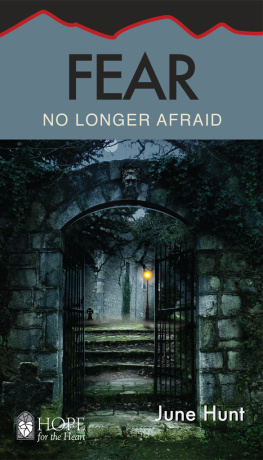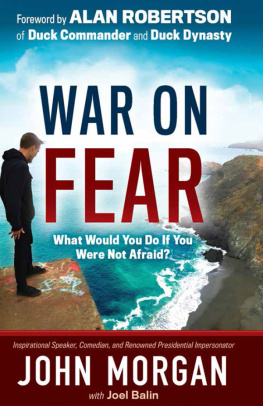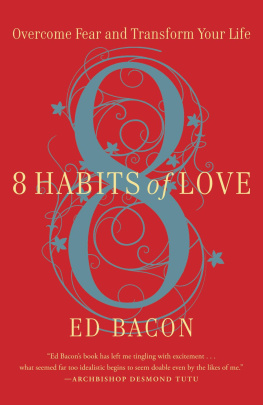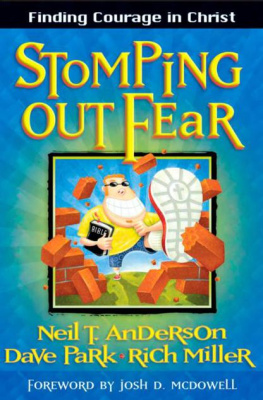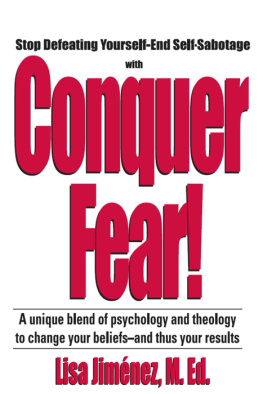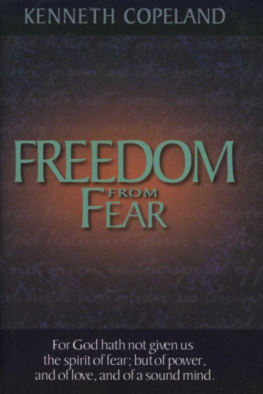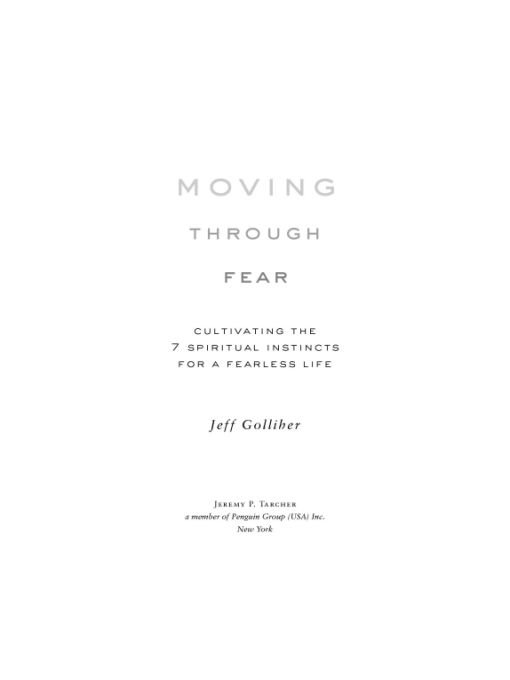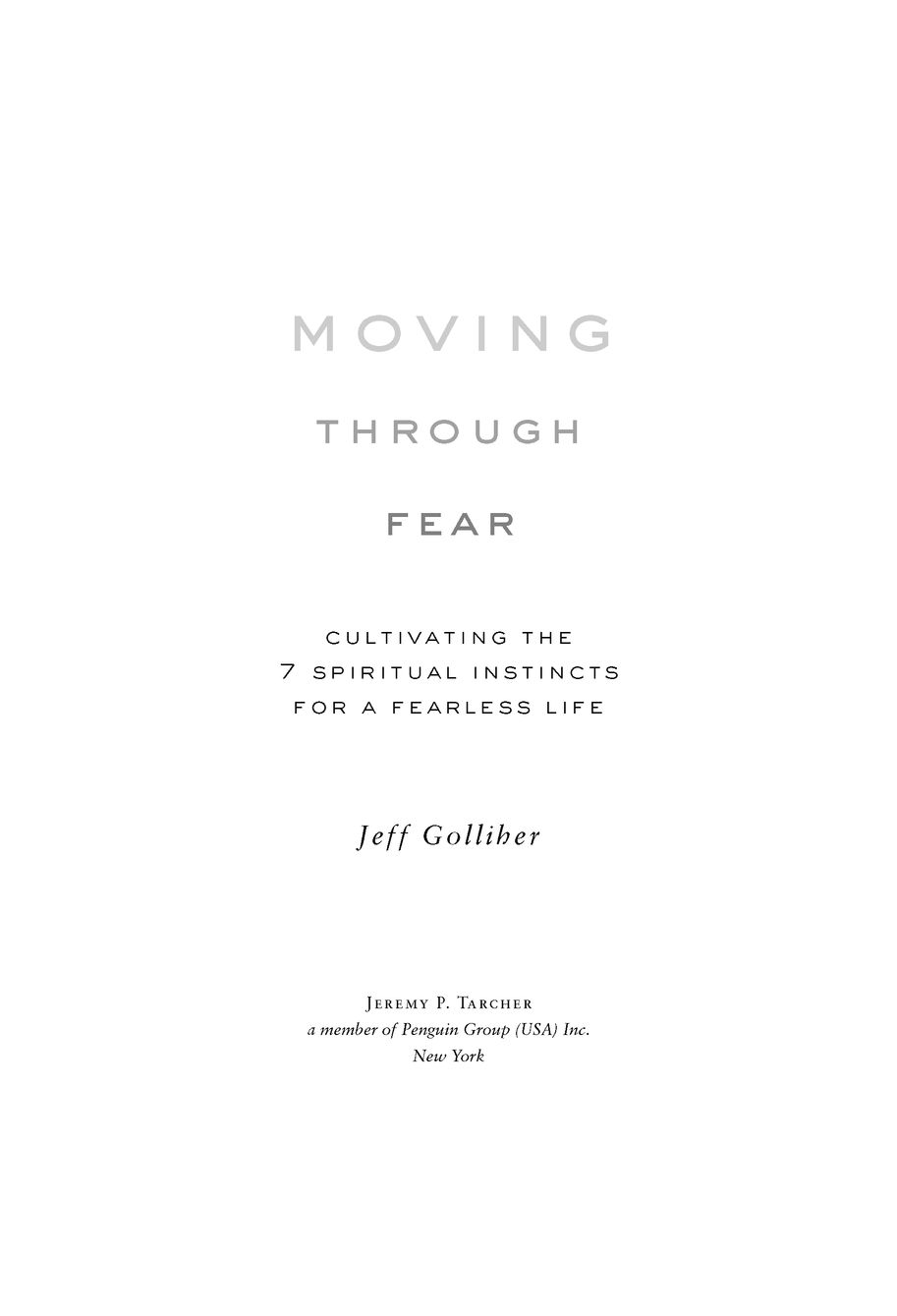Table of Contents
FOR
NENE
Do not let your hearts be troubled, and do not let them be afraid.
The Gospel According to John, 14:27b
PREFACE
LIVING IN THE REAL WORLD: THE CHOICE OF FREEDOM OR FEAR
Writing is always a labor of love, but an abiding love for the subject of fear is not among the reasons that Ive written this book. My labor has been for the love of freedom that we find by moving through our fear, and for the love of the world that fear would like to claim as its own. I have no deep-seated interest in fear itself. I dont like fear very much; I dont like to be afraid; and apart from the occasional entertainment of scary movies, I cant imagine why anyone would like it.
Let me quickly state that some fear is good and essential. Our very survival depends upon a healthy fright/flight response. It can focus our attention when we need it, wake us up from the slumbering existence we know all too well, and, most important, save our lives. And as terrible as real threats to our survival obviously arebad news from the doctor or stockbroker; the mere presence of vindictive, mean-spirited people; the possible collapse of the economic system; terrorism; environmental destruction generally; and climate change specifically, to name a few off the top of my headthey help us to remember the truly sacred parts of life that we habitually take for granted or ignore, despite the fact that they matter the most.
But most of our fear is not like that. Most of the fear that we carry around in our hearts, heads, bodies, and souls serves no useful, helpful, or adaptive purpose, and it can be harmful. No immediate threat to our survival or well-being is involved. Some of this fear might have had a legitimate basis sometime in the past, but the threat has gone, while the fear remains. This kind of fear can create a world unto itself. At first, it creeps into the fabric of our lives in small and subtle ways. Perhaps it only wounds our egos and self-confidence, which is not always a bad thing. Yet, if we carry this kind of fear around for very long, its impact becomes considerably more profound. It can alter the normal functioning of our bodies; for example, our breathing, stress responses, digestion, and who knows what else. Gradually, it changes how we see ourselves, live in the world, and relate to God or the possibility of God. Adaptable creatures that we are, this kind of fear can become a familiar way of life, so familiar that we learn to regard it as normal. We may tell ourselves that we have no substantial fears or that weve moved through our fear, when, in truth, were filled with it and nearly oblivious to its hugely relevant but unknown presence.
Most everyone I know struggles with harmful fear, not just one particular fear, but all kinds of fear, large and small, most of which are not acknowledged as fear. To make matters worse, a large portion of our harmful fear is anything but individualalthough we usually locate it within our private selves and confine it there, believing that the problem is solely ours. In fact, the source of this fear lies largely in society, politics, and religion. It is manufactured and manipulative. It magnifies the fear we already have and adds to it, and its overriding purpose is to create allegiances, followings, constituencies, and mass political movements.
Although the claim is made that this kind of fear leads to freedom in this world and saves our souls in the next, its more truthful to say that it simply serves the bottom line. The outcome is that we learn to see the world through that lens and to adopt it as ours, which is one of the reasons we harbor so much unacknowledged fear. Were told that these movements will move us through our fear, when they actually trap us within it. Rather than sharpening our senses or giving us a clearer sense of reality, they befuddle our faith and divert our attention from the very real destructive forces that we could turn in a more creative direction. This kind of fear has become integral to our way of life. It is so accepted and acceptable by large portions of the public and so ingrained in our culture that we, as a people, are in danger of no longer recognizing it for what it isjust plain fear.
Thats why its so peculiar when people say that the experience of fear offers a clearer vision of reality than we usually have. In a sense, they are right to say this, but only when and where the principle truly applies, and only up to a certain point. After that, fear can be one of the greatest obstacles in life that we ever face. As legitimate as some of our fear may be, to live in a world ruled by it is to move further and further from anything remotely resembling the real world.
Im not trying to be cute or simply playing with words. Like I said, some fear is obviously good and essential, but to surrender our lives to a world shaped or governed by fear is to risk losing ourselves and the world too. If we surrender to that kind of fear, then we will tell ourselves that were acting for the common good, when, in fact, we dont know what were doing or why were doing it. We fail to see the consequences of our actions, or we dont think about them at all. Rather than protecting us from danger, the fear that rules our lives makes us a danger to ourselvesand not only to ourselves. Stuck in our fear and afraid of what we might lose, we hand our lives and integrity over to our primal instincts, taking whatever we can as fast as we can, while ignoring those who suffer, as if they dont exist or have no right to exist. We become a danger to whole communities, including our families and friends, to people whom weve never met, and even to the great body of life, alive with Spirit, that we once knew as Gods green earth. That describes both our failure to live in the real world, and our relentless assault on it.
This is what I mean by finding, discovering, and living in the real world. Recall just one time in your life when you were trapped in fear, and then freed from it. Let yourself remember what it was like to be free again, to feel heartfelt love and friendship, to have done the right thing because you knew, in your soul, that it was the right thing to do. Remember what its like to smile a real smile that you cant hold back, to have a real sense of community in your life, to be who you really are, and to say what you really think. Once we remember that, and realize that its neither a fantasy nor a passing dream, then were well on our way to recovering what the real world really is and claiming it as our own.
Needless to say, the nature, purpose, and meaning of fear are deeply spiritual matters. For example, I would be among the first to proclaim that the fear of the Lord is the beginning of wisdom (Psalms 111:10a), having learned this invaluable lesson in survival on more than one occasion. And I would quickly add an equally important spiritual truth found in another biblical passage: There is no fear in love, but perfect love casts out fear (I John 4:18a). Well return to the thorny fear of God issue at some length later on, as it is central to what Ive written here. For now, let me only say that fear touches the most tender, vulnerable, and deeply personal part of our souls, which makes it exceedingly personal, but no less destructive. Of course, fear touches our souls. Up to a point, it can save our souls. After that, our fear is feeding on them.
John Newtons (17251807) inspiring wordsin the hymn Amazing Gracedescribe the interplay between fear and freedom in a profoundly moving way:



